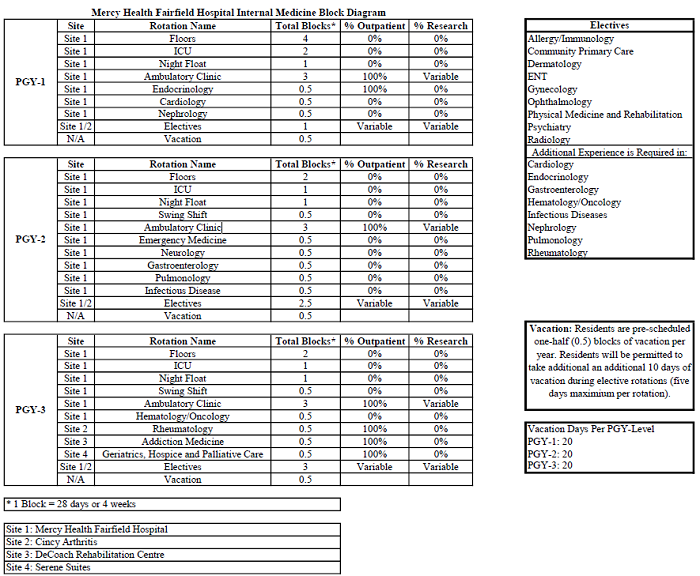Rotations and Curriculum — Internal Medicine Residency at Fairfield Hospital
Block Schedule
Our rotational experiences have been developed to maximize education opportunities while allowing our residents to thrive personally. Our program emphasizes personal wellness and resilience while maximizing educational experiences. Additionally, residents will integrate into multiple educational teams with shift hours never exceeding 12 hours. No resident will ever have to endure a 24-hour shift. For appropriate coverage, we utilize day and night float systems.
Our program is somewhat unique in that our academic schedule consists of 26 two-week blocks. With all rotations being two weeks in length, residents tend to end up with a both well-rounded experience as well as having a better work-life balance. This allows for our 6+2 schedule model, wherein residents are in the Mercy Health – Fairfield Internal Medicine Residency Clinic for two weeks, have three other two-week rotations (totaling six weeks) and then repeat the cycle throughout the academic year. This model maximizes the primary care education while allowing residents to focus on their inpatient learning opportunities during those rotations.
We are committed to compliance with ACGME’s Clinical Experience and Education Requirements (formerly known as Duty Hours). We strive to offer an effective program structure that provides work-life balance while enabling residents to gain requisite education and clinical experiences, as well as reasonable opportunities for rest and personal activities. Clinical and educational work averages from approximately 45 to 75 hours per week depending on rotation schedule.
 |
Resident Didactics
Weekly Educational Conference
Resident conferences will be scheduled weekly on Thursdays from 13:00-17:00. Topics will include a broad range of structured didactic activities and residents will have protected time to attend. Residents may be excluded from these conferences if they are on vacation or certain rotations, including but not limited to: nights, swing shift, and away rotations
Grand Rounds
Grand Rounds occur once every other month on Fridays from 12:00-13:00 and include critical care topics. These are multidisciplinary and discussion-based sessions which include nursing, pharmacy and multiple medical specialties.
Morbidity and Mortality
Residents will present a case where appropriate care was not delivered, or there was a near miss event. The focus is not on blame, but on process improvement. In light of this – the services involved are encouraged to attend to share their viewpoint. This is an opportunity for a critical appraisal of services offered, implementations that could improve quality of care provided, and mitigation of any patient safety concerns.
Journal Club/Debate
Interns will present “landmark trials” in a “typical” Journal Club format to learn how to critically appraise literature and how it impacts practice. Senior level residents will present a new article, briefly, following which a debate will occur on whether or not the article should change current practice.
Board Review Series
The Board Review series is an interactive, weekly session led by faculty using MKSAP to ultimately prepare for the ABIM Exam. During the group activity, questions will be reviewed, discussed, and, if necessary, corrected. This is to highlight test taking skills and abilities.
Simulation Lab
A new state-of-the-art simulation lab will be incorporated into the didactic curriculum. The simulation lab will include 2 exam rooms, one for outpatient simulations and one for ICU/inpatient simulations. Residents will participate in mock patient encounters to learn not only how to properly conduct general patient encounters, rapid responses, and code blues, but also perform procedures including intubations and central lines.
GME/Institution
Topics will be presented by GME and/or the institution and include:
- Resident forum with DIO
- Administrative Hospital Related topics/initiatives and quality metrics
- Wellness (Financial, mental, and other)
- Social Determinants of Health
- DEI
- Other topics as determined by GME or the institution
Facilities
Mercy Health – Fairfield Hospital
Fairfield Hospital has 211 acute care beds, with 36 emergency department beds, 36 ICU beds, and has over 12,000 discharges annually. The hospital offers a broad range of inpatient and outpatient services. It was recently listed on Becker’s “Great Hospitals in America,” and has also been listed among “America’s Best 50 Hospitals,” by Healthgrades.
Mercy Health – Fairfield Hospital Internal Medicine Practice
Our newly renovated resident continuity clinic space on the campus of the Mercy Health – Fairfield Hospital features 10 examination rooms including a procedure room, with built-in computers to each exam room. Residents learn the essentials of ambulatory internal medicine and see a wide variety of patients and pathologies in the clinic. There is a laboratory conveniently located on the campus, making it easily accessible to our patients.
Cincy Arthritis
Located in Blue Ash about 15 minutes from the Mercy Health – Fairfield Hospital, this busy private-practice rheumatology clinic is where our residents have their rheumatology experience. Under the supervision of core faculty member Dr. Adhikari, residents will see a breadth and depth of rheumatology cases.
DeCoach Rehabilitation Centre – Fairfield
Situated less than two miles from the Mercy Health – Fairfield Hospital, our residents will have their addiction medicine experience at this location. As an important community resource, DeCoach offers medication assisted treatment, residential treatment, mental health care, community and court services to help combat addiction.
Serene Suites
Located in Blue Ash, about 15 minutes from Mercy Health – Fairfield Hospital, Serene Suites is a memory care assisted living facility where our residents will work with Dr. Srivastava who is board-certified in geriatric medicine as well as hospice and palliative care. Residents will provide care to a geriatric population often in need of palliative or end-of-life care.
Research and Scholarly Activity
All residents are required to have scholarly activity as a graduation requirement. Scholarly activity can be in the form of a Grand Round presentation, publication or poster presentation at local, regional or national conferences. Subject matter could include original research, quality improvement project(s), case reports, or reviews among other possibilities. To aid in these scholarly endeavors, we have the support of a Regional Academic Research Coordinator, Dr. Theresa Hageman.